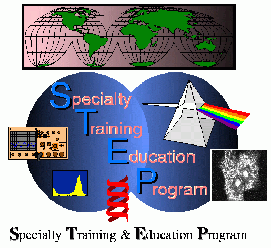 |
 |
 |
 |

[Introduction to STEP]
[Table of Contents]
[STEP HomePage]
[Search for Keyword]
Integrated Diagnostics 1756 Sulphur Spring Road Baltimore, MD 21227
1. Facilities: Laboratory has expanded into two locations. A cell biology laboratory with tissue culture facilities has been established in support of the flow cytometry/image cytometry laboratory. The main laboratory houses instrumentation, and clinical and research/development work areas.
2. Instrumentation: There are seven flow cytometers. Three EPICS Profiles, two EPICS XLs, and EPICS elite equipped with argon, He-Ne, and UV lasers, and a FACScan. The laboratory also has an image analysis system with the ability for both light and fluorescence microscopy.
3. Specialization Areas:
Analytical capabilities: Six routinely used IBM PC-compatible flow cytometers are networked for data analysis and storage. Flow cytometry software in use or in testing includes Coulter Elite, Coulter XL, Coulter Profile, Phoenix, Verity, and Becton-Dickinson. For image analysis, RPW is used.
Clinical applications: Routine work includes CD4/CD8 monitoring as well as other extensive two-, three-, and four-color immunophenotyping panels on HIV, leukemias, lymphomas, and other immunological disorders. Routine work is not only referred by nearby hospitals and doctors' offices, but is also sent in by researchers and clinicians in other parts of and outside of the United States. The flow cytometry laboratory is a central reference laboratory for large-scale clinical drug and vaccine trials. Reticulocyte analysis is also done on a routine basis. DNA ploidy analysis by flow cytometry is performed on fresh, frozen, and paraffin-embedded tissues of different types. Urine specimens submitted for DNA ploidy analysis are done by image cytometry.
Quality assurance: The laboratory participates in several surveys including CAP, NIAID, CDC, and New York State which measure the laboratory's performance against other laboratories. The laboratory also participates in the Coulter Instrument Quality Control Program.
4. Special Opportunities:
5. Special Courses Offered: Internship possibilities.
6. Graduate Program: None at this time.
7. Local Accommodations: The lab is situated in the Baltimore-Washington Metropolitan area, with many hotels within 5-10 miles of the laboratory.
8. Transportation: Baltimore-Washington International Airport is less than 10 miles away. There is also easy access to two other major airports.
9. Cost of Internship: $600.00/week
10. Communication:
Helene Paxton Integrated Diagnostics, Inc. 1756 Sulphur Spring Road Baltimore, MD 21227 Phone: (410) 737-8500 FAX: (410) 536-1212
 |
 |
 |
 |